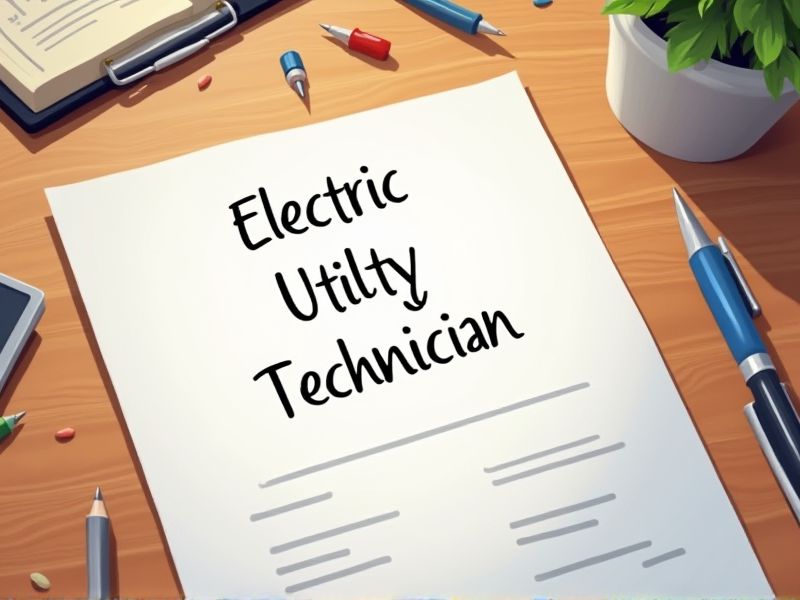
Electric Utility Technicians work in environments requiring stringent adherence to safety protocols due to high-risk factors associated with electricity. Certifications ensure that technicians possess the necessary skills and knowledge to handle complex electrical systems effectively. Employers often mandate these certifications to reduce liabilities and maintain compliance with industry regulations. Here's a look at some essential certifications for Electric Utility Technicians.
NERC CIP Certification
NERC CIP Certification is required due to the critical need for securing North America's bulk power system against cyberthreats. Electric utility technicians must adhere to stringent security standards to ensure the reliability and integrity of the power grid. By gaining this certification, technicians demonstrate their understanding of compliance requirements, minimizing the risk of non-compliance penalties. Holding NERC CIP Certification enhances a technician's ability to implement security protocols effectively, thus protecting vital infrastructure from disruptions.
OSHA 30-Hour Training Certification
Electric utility technicians often work in hazardous environments, and the OSHA 30-Hour Training Certification provides comprehensive knowledge on safety standards and regulations, minimizing the risk of workplace injuries. Understanding OSHA guidelines equips technicians with the skills to identify and manage potential electrical hazards, ensuring a safer worksite. The certification promotes a culture of safety awareness, which can lead to lower incident rates and compliance with federal safety laws. Employers may require certification as part of their safety protocols to avoid costly penalties associated with safety violations.
NFPA 70E Arc Flash Awareness Certification
NFPA 70E Arc Flash Awareness Certification is essential for Electric Utility Technicians because it ensures they comprehend the dangers associated with arc flash incidents, reducing potential injuries. Understanding safety protocols outlined in this certification limits liability risks for employers by promoting a safer work environment. Technicians equipped with this knowledge effectively identify and mitigate hazardous situations, leading to enhanced safety compliance. Certification contributes to a culture of safety, minimizing downtime and operational disruptions due to accidents.
Utility Line Worker Certification
Utility Line Worker Certification is required to ensure electric utility technicians have the necessary skills to safely handle high-voltage equipment. Acquiring this certification reduces the risk of accidents and injuries on the job by instilling best safety practices. It validates the technician's aptitude in electrical theory and practical application, enhancing overall service reliability. Insurance regulations and industry standards often mandate this certification, affecting eligibility for employment and projects.
Journeyman Electrician License
A Journeyman Electrician License ensures that an Electric Utility Technician has the necessary training and knowledge to safely handle electrical systems. Employers often require this license to comply with safety regulations and reduce the risk of accidents. Holding a license can lead to higher earning potential by demonstrating proficiency and commitment to the profession. In many regions, legal requirements mandate that only licensed electricians perform specific electrical work to protect public safety.
High-Voltage Safety Certification
High-Voltage Safety Certification ensures electric utility technicians understand the risks associated with high-voltage systems, which directly reduces the likelihood of accidents. This certification equips technicians with knowledge of proper safety protocols, subsequently minimizing electrical hazards. Skilled handling of high-voltage equipment, facilitated by the certification, enhances operational efficiency and reliability of electrical utilities. A certified workforce directly correlates with improved public safety and reduces potential liabilities for utility companies.
Certified Electrical Inspector Certification
Certified Electrical Inspector Certification ensures that Electric Utility Technicians possess comprehensive knowledge of current electrical codes and standards. This certification provides credibility, fostering trust from employers and customers in their expertise. Adherence to the certification impacts safety, reducing the incidence of errors leading to accidents and equipment failure. Increased job opportunities and career advancement arise as certified inspectors are often preferred over non-certified professionals.
PLC Programming Certification
Acquiring a PLC Programming Certification equips an electric utility technician with the necessary skills to efficiently operate and troubleshoot programmable logic controllers in modern utility systems. The increasing automation in power industries demands that technicians understand and manage the intricate systems which streamline operations. Holding this certification often leads to improved job prospects and potential salary increases, as employers value verified expertise. Accurate and updated knowledge ensures safety and reliability in handling complex electrical tasks, directly impacting operational efficiency and risk reduction.
SCADA Systems Certification
SCADA systems certification ensures electric utility technicians are equipped with the necessary skills to effectively monitor and manage complex power grid infrastructures. Enhanced competency reduces the risk of outages and improves system reliability, as certified technicians can quickly diagnose and address issues. Regulations and standards in the utility sector require that workers meet specific technical competencies, which certification can verify. With advancements in technology, certification keeps technicians updated on the latest SCADA innovations, directly impacting operational efficiency and safety.
CPR/First Aid Certification
Electrical utility technicians often work in high-risk environments where electric shock, falls, or other accidents can quickly occur. Being CPR/First Aid certified enables them to provide immediate assistance, potentially saving a colleague's life before professional medical help arrives. This certification augments workplace safety protocols, promoting a culture of preparedness and responsibility. Employers value this qualification as it aligns with occupational safety regulations and can reduce liability in hazardous work conditions.
Summary
When you become certified as an Electric Utility Technician, your job opportunities often expand significantly. Employers generally prefer certified technicians, which may lead to faster career advancement for you. Certification can result in higher earning potential through increased trust in your skills. Your technical expertise is validated, reducing the risk of workplace errors and enhancing safety standards.
